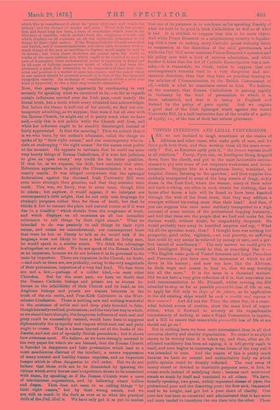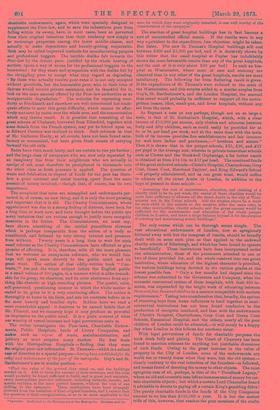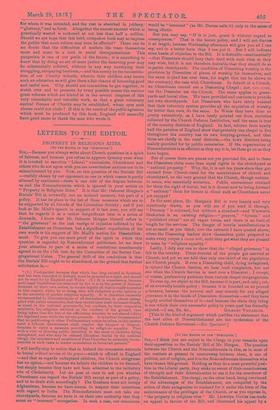VESTED INTERESTS AND LEGAL PERVERSIONS.
IRE we not inclined to laugh sometimes at the stories of Africans and other races, who make gods of men,.and let these gods beat them, and then worship them all the mere rever- ently? But, as Emerson aptly puts it, " the human repeateitself in all, relations." Fancy, if you can, an Intelligent Being dropped down from the clouds, and put in the most favourable circum- stances to pry into some of our corporate weaknesses and incon- sistencies. Suppose him at a sumptuous. livery, municipal, or hospital dinner, listening to the speeches ; and then suppose him suddenly transported to some of the long streets of dingy, sickly slums in the East-End, where the women, many of them sober and hard-working, are often in such straits for clothing, that in house after house a hole will be found to have been knocked through the wall of the front room, that they may addgess a stranger without his seeing more than their head! And then, if you can suppose him once more suddenly transported to a high caroessal of some section of the professional begging fraterpity, and told that these are the people that we feed and make fat, his distress would, without doubt, be unspeakably deepened. He would probably turn away in horrifled surprise and say, "What did all the speeches mean, then? I thought here,was nothing but prosperity, good order, vigilance,—no. real poverty, no suffering that could by any means be relieved by money or care, ,and a per- fect hatred.of mendicancy !" The only answer we coald give to said Intelligent Being would be this, or something like it :— "We English make gods of Vested Interests and Legal Precedent and Pezversion; you have seen the sacrament at which we it down in his honour ; and now see how, like the Africans, -he finds ways and means to beat us, that we may. worship him all the more." It is the same in a thousand matters. Did we not have a very grim reflection of it in that somewhat too bold recommendation to Mr., Plimsoll, whilst revising, the
intended to atop as far as. possible preventible lose of life at, sea, to apply his Bill only to ships of the future, as its application to the old existing ships would be such, a trouble and. expease to their owners? And did not the Times the other day, in a some- what belated access of caution, show the same kind of super- stition, when it frowned so severely at the unparelogeble inconsistency of seeking at once a Royal Commission to inquire, and a Bill to ensure that meanwhile preventible loss of life at sea should not go on ?
But in nothing have we been more inconsiatent than in ell that concerns charity and charity organisation. No cooper is an pbject shown to be worthy than it is taken up, and thee, after pa ill- adjusfr.ed machinery isas been set agoing, it is left,pretty much to itself, and soon begins to, encourage worse forms of the very evil it was intended to cure. And the reason of this, is pretty much . because we have no central and authoritative . body op which public opinion could be directly reflected. The vast mina of money raised or devoted to charitable purposes seem, in fact, to .create needs instead. of satisfying them ; because each moVereent steads so much,by. itself mad unrelated to , all. others: Wn Java, broadly speaking, two-great, widely-separatedelasses of peon; -the professional poor. and the deserving -poor ; the first steak, the sowed need to be sought, and get but .a poor- Aare of charity. Our poor-law has been so conceived and administered that it himmore and more tended to transform the one class into, the other. Those
stharitable endowments, again, which were specially designed to supplement the Poor-law, and to save the industrious poor from falling within its sweep, have, in most cases, been so perverted from their original intention that their tendency now simply is to encourage pauperism among the lower middle-classes, and actually to make dependence and bounty-getting respectable.
31)th may be called improved methods for manufacturing paupers and professional beggars. The terrible dislike felt towards the lroor-law by the decent poor, justified by the whole bearing of matters, opens a way of access for the professional beggars to the henevolent ; for they share and sympathise with the dislike felt by
The struggling poor to accept what they regard as degrading. 6' By those who actually receive poor-rates it is not only accepted
without gratitude, but the honourable poor, who in their time of distress would receive private assistance, and be thankful for it,
'look on the same amount offered by the Poor-law authorities as an insupportable degradation." The societies for repressing men- dicity at Blackheath and elsewhere are well-intentioned but inade- quate efforts to meet this great difficulty, which cannot be effec- tively met save by union over the whole area, and the concentration which may thence result. It is possible that something of the great scheme of Chalmers, borrowed from Elberfeld, together with
some details from the French system, may yet be forced upon us, as Edward Denison was inclined to think. Such schemes as that of Mr. Gathorne Hardy, at all events, have not been found satis- factory or economical, but have given fresh means of carrying forward the old evils.
Rates have risen much lately, and are certain to rise yet further ; and the large class of ratepayers who are now only separated by an imaginary line from their neighbours who are actually in receipt of aid, must therefore be precipitated in thousands into The other class as fresh pressure is applied. The question of waste and defalcation in respect of funds for the poor has there- Jose a great national and social bearing, apart from the mere amount of money involved,—though that, of course, has its own importance.
The complaint that rates are misapplied and endowments per- serted is, of course, no new thing, and it is only the more pressing
3.10 important that it is old. The Charity Commissioners, whose appointment was due to a strong feeling of distrust, have been for a long time at work now, and have brought before the public eye
many instances that are curious enough to justify more energetic measures in the future. The Commissioners, we must say, save shown something of the settled punctilious slowness which is perhaps inseparable from the action of a body so constituted, and fettered by very strong interest and pressure from without. Twenty years is a long time to wait for such small reforms as the Charity Commissioners have effected or give promise of effecting. It is, therefore, with all the more pleasure that we welcome an anonymous reformer, who we would fain lOpe will speak more directly to the public mind and its
great want. The author of that oddly-written book "Con- trasts,'* has put the whole subject before the English public ii a small volume of 300 pages, in a manner which is alike remark-
able for its grasp, its clearness, and its utter abstinence from any- thing like rhetoric or high-sounding phrases. The quaint, calm, self-possessed, questioning manner in which the whole matter is stated to us, gives to it a very convincing effect. The author is Thoroughly at home in his facts, and sets his contrasts before us in The most homely and familiar style. Seldom have we read a more remarkable appeal : it deserves to be named beside that of Mr. Plimsoll, and we sincerely hope it may produce as powerful an impression on the public mind. It is a plain account of what ear worship of vested interests and legal perversions costs us.
The writer investigates the Poor-laws, Charitable Endow- ments, Public Hospitals, funds of Livery Companies, and
makes such an expose of waste, maladministration, and jobbery as must surprise many readers. He first deals with the Metropolitan Hospitals — finding that they were the original poor-law infirmaries. St. Thomas's—which is a salient case of direction to a special purpose—having been established for the relief and maintenance of the poor of the metropolis. Guy's and St. Bartholomew's are in similar position :—
"Find the value of the ground they stand on, and the buildings erected on it. Add to these the amount of their revenues, and the total would probably be found sufficient to build, and in great part maintain, wary metropolitan poor-law infirmary, including imbecile, lunatic, and epecial asylums, in the most perfect manner, without the cost of ono shilling to the ratepayer. These institutions have been strangely diverted from the intention of their original founders, and I submit that She question of their reorganisation, so as to be more applicable to tho
• Contrasts. Dedicated t) the Ratepayers of the Metropolis. Strahan and Co. trifle of this, however, that reaches the poor members of the crafts uses for which they were originally intended, is one well worthy of the consideration of the ratepayer."
The erection of great hospital buildings has in fact become a sort of uncontrolled official mania. If the results were in any way eluivalent to the expenditure, less objection might be taken. But listen. The new St. Thomas's Hospital buildings will cost between £800 and £1,000 per bed, and it is decisively shown by this writer that the small hospital at Poplar has indubitably shown far more favourable results than any of the great hospitals, and the cost of it is only about 1,30 per bed In such an hos- pital as Westminster, where more of care and economy are observed than in any other of the great hospitals, results are more satisfactory. The following far from flattering result is given.
If the expenditure of St. Thomas's were reduced to the scale of the Westminster, and this surplus added to a similar surplus from Guy's, St. Bartholomew's, and the London Hospital, the amount thus saved would probably be sufficient to support all the metro- politan insane, idiot, small-pox, and fever hospitals, without any aid from the rates.
As flagrant a case as any perhaps, though not on so large a scale, is that of St. Katherine's Hospital, which, with a clear income of £12,000 per annum, only clothes and educates between forty and fifty children, such as could easily be provided for at 8s. or Os. per head per week, and at the same time with the main bulk of its income provides fine establishments and fair incomes for well-born ladies and gentlemen,—" brethren and sisters." Then it is shown that in the pauper schools, £25, £26, and £27 per pupil is the average cost, whereas in private benevolent schools such as Clewer and the Stockwell Orphanage, a far better result is obtained at from £14 108. to £17 per head. The combined funds of the great endowed schools—Christ's Hospital, Charterhouse, Grey Coat, Green Coat, Merchant Taylors', and King Edward's School —if properly administered, and as one great trust, would suffice to educate all the street Arabs in London, in addition to the boys at present in these schools :--
" Assuming the cost of maintenance, education, and clothing of a charity child to be 6s. per week, the rental of these charities would be more than sufficient to educate all the street Arabs in the city of West- minster not in the Union schools. Add the surplus above 6s. a week for each child in the schools to the surplus, after the same ratio, in the other metropolitan charity schools, and the gross amount would be sufficient for the maintenance and education of the whole pauper children in London, and leave a large balance beyond it for the purpose of erecting and maintaining school buildings."
The only course which can be thorough seems simple. The vast educational endowments of London, now so egregiously frittered away with but the meagreet of results, should be broadly dealt with on some such plan as that applied to the endowed charity schools of Edinburgh, and which has been found to operate so beneficially. These institutions have been incorporated under one administration, those of the pensioners attached to one or two of them provided for, and the whole resolved into one great institution, where education of the highest character is provided, the various buildings being devoted to the various grades at the lowest possible fees. "Only a few months had elapsed since the scheme was submitted to the Governors and Company, when the monastic conventual system of these hospitals, with their 230 in-
mates, was superseded by the bright work of educating between three and four thousand children in a manner compatible with modern
requirements." Taking into consideration that, broadly, the system
of removing boys from home influences to herd together in semi- conventual institutions has not been found conducive to the production of energetic manhood, and that with the endowments of Christ's Hospital, Charterhouse, Grey Coat and Green Coat Schools, Emmanuel Hospital, and the others, nearly all the poor children of London could be educated,—it will surely be a happy day when London in this follows her northern slater.
With legal perversions of funds for charitable purposes the book deals fully and plainly. The Court of Chancery has been found to sanction schemes for anything but justifiable diversions of such funds. Owing to the great increase in the value of
property in the City of London, some of the endowments are worth ten or twenty times what they were, but the old system—
clearly contrary to the real intention of the founders—is followed, and means found of devoting the money to other objects. The most egregious case of all, perhaps, is that of the " Troutbeck Legacy," where an old and eccentric man left an immense sum of money for cer- tain charitable objects ; but which a certain Lord Chancellor found it advisable to devote to paying off a certain King's gambling debts !
The purely charitable funds in the hands of the City Companies amount to no leas than £110,000 a year. It is but the merest
• Contrasts. Dedicated t) the Ratepayers of the Metropolis. Strahan and Co. trifle of this, however, that reaches the poor members of the crafts
for whom it was intended, and the rest is absorbed in jobbery, '"gluttony," and so forth. Altogether the annual amount which is practically wasted is reckoned at not less than half a million. :Should we not hope that this bold, outspoken book may so impress the public that some reform may soon be effected? There can be .no doubt that the difficulties of modern life trace themselves more and more to a root in social disorganisations. This pauperism is one of our perils of the future ; it is something to know that by doing an act of mere justice the deserving poor may be substantially relieved, without in any way burdening their struggling, ratepaying brethren,—and this merely by the reconstitu- tion of our Charity Schools, wherein their children may secure such an education as will give them a fair chance of becoming good and useful men. Why should not committees be got together, to watch over and to promote by every possible means the various great reforms which are hinted at in the several chapters of this very remarkable and valuable work, so that a great voluntary central Bureau of Charity may be established, whose eyes such abuses could not elude ? If this is the result of the public agitation which must be produced by this book, England will assuredly lave good cause to thank the man who wrote it.








































 Previous page
Previous page